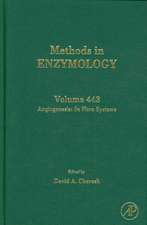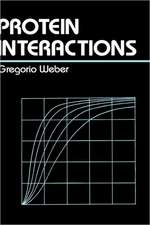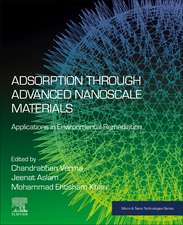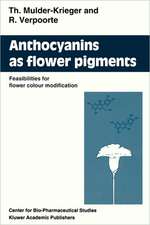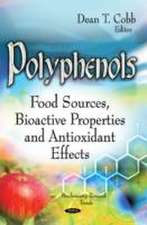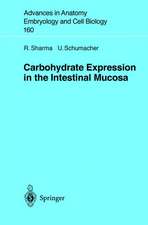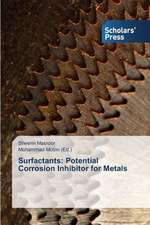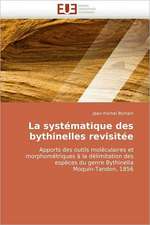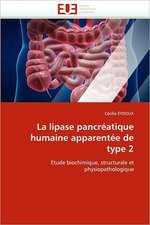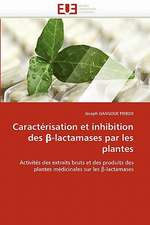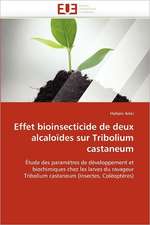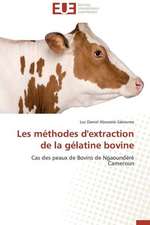Advancements in Biosurfactants Research
Editat de Ruby Aslam, Mohammad Mobin, Jeenat Aslam, Saman Zehraen Limba Engleză Paperback – 27 ian 2024
| Toate formatele și edițiile | Preț | Express |
|---|---|---|
| Paperback (1) | 1012.84 lei 6-8 săpt. | |
| Springer International Publishing – 27 ian 2024 | 1012.84 lei 6-8 săpt. | |
| Hardback (1) | 1400.35 lei 6-8 săpt. | |
| Springer International Publishing – 26 ian 2023 | 1400.35 lei 6-8 săpt. |
Preț: 1012.84 lei
Preț vechi: 1235.17 lei
-18% Nou
Puncte Express: 1519
Preț estimativ în valută:
193.83€ • 201.13$ • 162.01£
193.83€ • 201.13$ • 162.01£
Carte tipărită la comandă
Livrare economică 17-31 martie
Preluare comenzi: 021 569.72.76
Specificații
ISBN-13: 9783031216848
ISBN-10: 3031216849
Pagini: 576
Ilustrații: XII, 576 p. 1 illus.
Dimensiuni: 155 x 235 mm
Greutate: 0.82 kg
Ediția:1st ed. 2023
Editura: Springer International Publishing
Colecția Springer
Locul publicării:Cham, Switzerland
ISBN-10: 3031216849
Pagini: 576
Ilustrații: XII, 576 p. 1 illus.
Dimensiuni: 155 x 235 mm
Greutate: 0.82 kg
Ediția:1st ed. 2023
Editura: Springer International Publishing
Colecția Springer
Locul publicării:Cham, Switzerland
Cuprins
Part 1: Overview and Economic Aspect of Biosurfactants Production.- Chapter 1: Biosurfactants-Types, Sources, and Production.- Chapter 2: Innovative and sustainable production processes for biosurfactants.- Chapter 3: Sustainable production of biosurfactants using waste substrates.- Chapter 4: Characterization and purification of Biosurfactants.- Chapter 5: Biodegradation and Cytotoxic effect of the Biosurfactants.- Chapter 6: Comparison of biodegradability, and toxicity effect of biosurfactants with synthetic surfactants.- Chapter 7: Surface activity and emulsification properties of saponins as biosurfactants.- Part 2: Biosurfactants: Current Industrial Applications.- Chapter 8: Biosurfactants as emulsifying agents in food formulations.- Chapter 9: Applications of Biosurfactants as Anti-Corrosive Agents.- Chapter 10: Role of biosurfactants in nanoparticles synthesis and their stabilization.- Chapter 11: New trends in the textile industry: utilization and aplication of biosurfactants.- Chapter 12: Biosurfactants as an ecofriendly technology in heavy metal remediation.- Chapter 13: Biosurfactants and their perspectives for application in drug adsorption.- Chapter 14: Role of biosurfactants in promoting biodegradation in waste treatment.- Chapter 15: Role of Biosurfactants in Agriculture Management.- Chapter 16: Biosurfactants and their benefits for seeds.- Chapter 17: Role of biosurfactants in marine sediment remediation of organic pollutants.- Chapter 18: Role of Biosurfactants in biofuel production.- Part 3: Biosurfactants: Current Biomedical Applications.- Chapter 19: Role of biosurfactants in Biocidal activity and wound healing.- Chapter 20: Role of Biosurfactants as antitumor agents.- Chapter 21: Biosurfactants in oral cavity care.- Chapter 22: Role of biosurfactant in Biofilm prevention and disruption.- Part 4: Biosurfactants: Commercialization, challenges and future outlook.- Chapter 23: Advantages and Disadvantages over other synthetic surfactants.- Chapter 24: Commercialization of Biosurfactants.- Chapter 25: Challenges and Future Outlooks.
Notă biografică
Ruby Aslam, PhD., is currently a Research Associate fellow under CSIR-HRDG, New Delhi in the Department of Applied Chemistry, Aligarh Muslim University, Aligarh, India. She received her M.Sc., M. Phil. and PhD degrees from the same university. She has authored/co-authored several research papers in international peer-reviewed journals of wide readership, including critical reviews and book chapters.
Mohammad Mobin, Ph.D, has 34 years of an extremely active and productive career, working at the Aligarh Muslim University and multinational Seawater Desalination Research Institute, Saline Water Conversion Corporation (SWCC), Kingdom of Saudi Arabia. At Aligarh Muslim University, he is working as a Professor in the Department of Applied Chemistry and is involved in the teaching and research in materials and corrosion. Dr. Mobin has completed 28 root cause failure investigations, 8 major and 3 minor research projects on materials and corrosion, including two projects under international collaboration. Dr. Mobin has a Ph.D. in corrosion, supervised 14 students for the award of the Ph.D. degree, and authored 166 research papers. He has also attended 35 national/international conferences/workshops.
Jeenat Aslam, PhD, is currently working as an Assistant Professor at the Department of Chemistry, College of Science, Taibah University, Yanbu, Al-Madina, Saudi Arabia. She obtained her PhD inSurface Science/Chemistry at the Aligarh Muslim University, Aligarh, India. Her research is mainly focused on materials & corrosion, nanotechnology and surface chemistry. Dr. Jeenat has published several research and review articles in peer-reviewed international journals of ACS, Wiley, Elsevier, Springer, Taylor & Francis and BenthamScience etc. She has authored/edited many books and has contributed to twenty-seven book chapters.
Saman Zehra, Ph.D., is currently working as a Women Scientist under the WOS-A program of the Department of Science and Technology (DST), New Delhi, India, in the Department of Applied Chemistry of Aligarh Muslim University, Aligarh. She also has worked as a Post-Doctoral research associate in the same department. She received her Ph.D. and M.Sc. from the same university. Her research interest lies in developing smart coating materials for corrosion sensing and protection and evaluating green corrosion inhibitors. She has published 35 articles in international peer-reviewed journals, including reviews and book chapters. She has also presented her research work at various national and international conferences.
Mohammad Mobin, Ph.D, has 34 years of an extremely active and productive career, working at the Aligarh Muslim University and multinational Seawater Desalination Research Institute, Saline Water Conversion Corporation (SWCC), Kingdom of Saudi Arabia. At Aligarh Muslim University, he is working as a Professor in the Department of Applied Chemistry and is involved in the teaching and research in materials and corrosion. Dr. Mobin has completed 28 root cause failure investigations, 8 major and 3 minor research projects on materials and corrosion, including two projects under international collaboration. Dr. Mobin has a Ph.D. in corrosion, supervised 14 students for the award of the Ph.D. degree, and authored 166 research papers. He has also attended 35 national/international conferences/workshops.
Jeenat Aslam, PhD, is currently working as an Assistant Professor at the Department of Chemistry, College of Science, Taibah University, Yanbu, Al-Madina, Saudi Arabia. She obtained her PhD inSurface Science/Chemistry at the Aligarh Muslim University, Aligarh, India. Her research is mainly focused on materials & corrosion, nanotechnology and surface chemistry. Dr. Jeenat has published several research and review articles in peer-reviewed international journals of ACS, Wiley, Elsevier, Springer, Taylor & Francis and BenthamScience etc. She has authored/edited many books and has contributed to twenty-seven book chapters.
Saman Zehra, Ph.D., is currently working as a Women Scientist under the WOS-A program of the Department of Science and Technology (DST), New Delhi, India, in the Department of Applied Chemistry of Aligarh Muslim University, Aligarh. She also has worked as a Post-Doctoral research associate in the same department. She received her Ph.D. and M.Sc. from the same university. Her research interest lies in developing smart coating materials for corrosion sensing and protection and evaluating green corrosion inhibitors. She has published 35 articles in international peer-reviewed journals, including reviews and book chapters. She has also presented her research work at various national and international conferences.
Textul de pe ultima copertă
This book presents numerous uses of biosurfactants as potential alternatives to synthetic surfactants in food, textile, biomedical and therapeutic applications as well as in bioremediation and waste management. Divided into four parts, the book explores a wide range of biosurfactants as sustainable materials, starting with an overview of biosurfactants’ production, in which readers will find topics such as characterization, purification, sustainable production, biodegradation, and cytotoxic aspects of biosurfactants. Part 2 presents the latest applications of biosurfactants in food and textile industries, as well as their application in nanoparticle synthesis, heavy metal remediation, drug absorption, waste treatment, agriculture management, marine sediment remediation of organic pollutants, emulsification and biofuel production, and as anti-corrosive agents. Part 3 traces current biomedical applications of biosurfactants, including their use as biocidal, wound healing, and anti-tumour agents. In this part, readers will also discover further applications of biosurfactants in oral cavity care, and biofilm prevention and disruption. The final part of the book discusses the main advantages and disadvantages of biosurfactants over synthetic surfactants, the current challenges in biosurfactant research, and prospects for their commercialization. This book will be a valuable resource for students, scholars and researchers working in the fields of colloidal and interface science, chemistry and chemical engineering. Professionals and scholars alike will appreciate the latest research findings that it presents.
Caracteristici
Presents recent advancements in biosurfactants field Discusses industry-oriented applications of biosurfactants Ellaborates on present challenges and future perspectives


